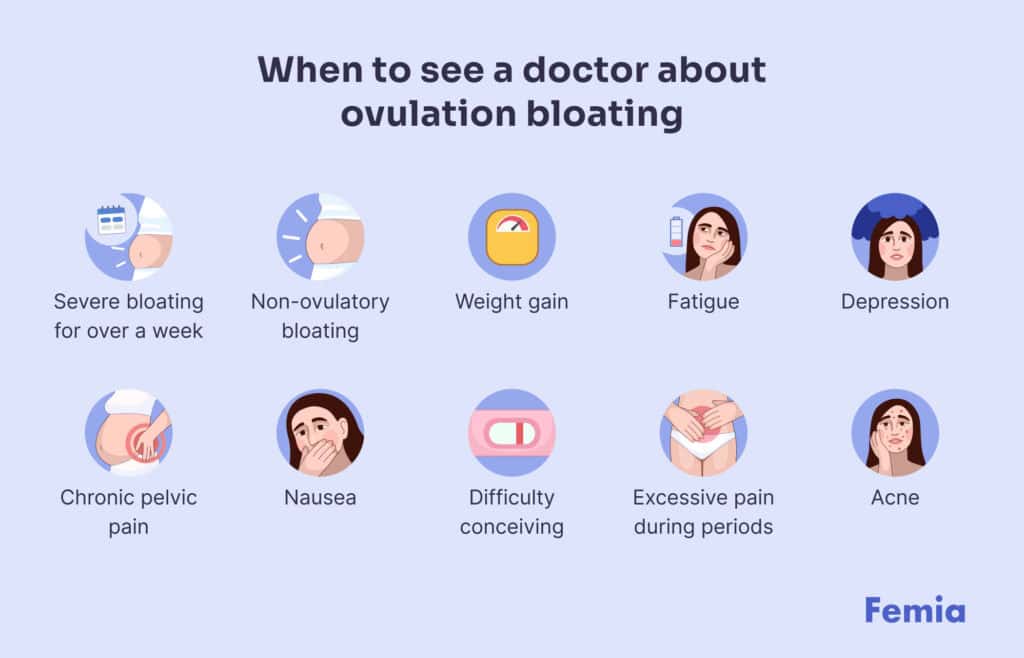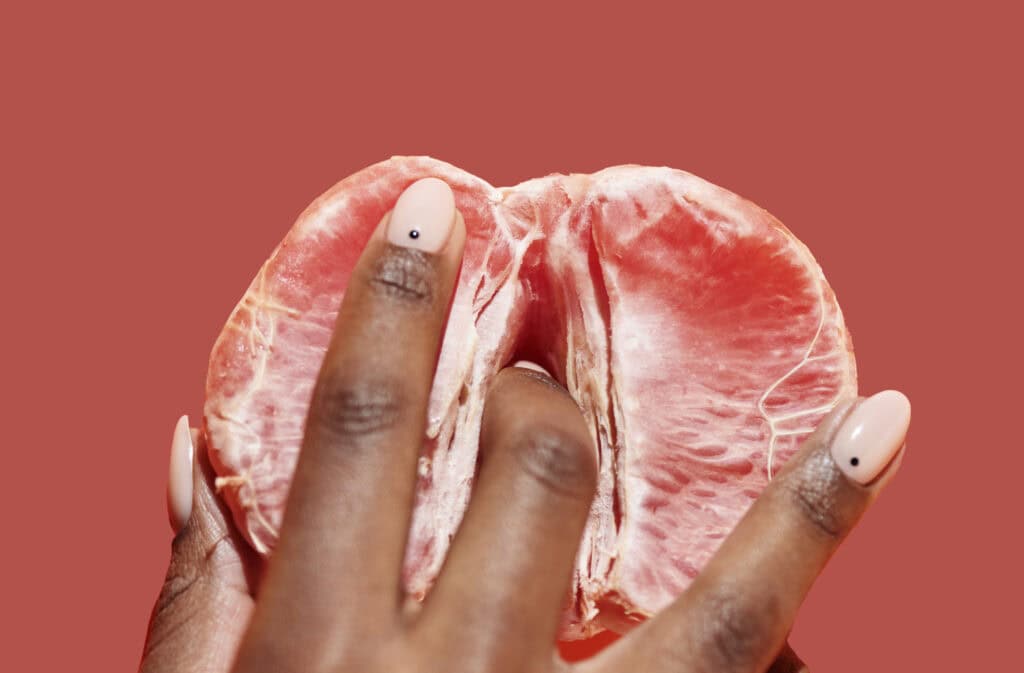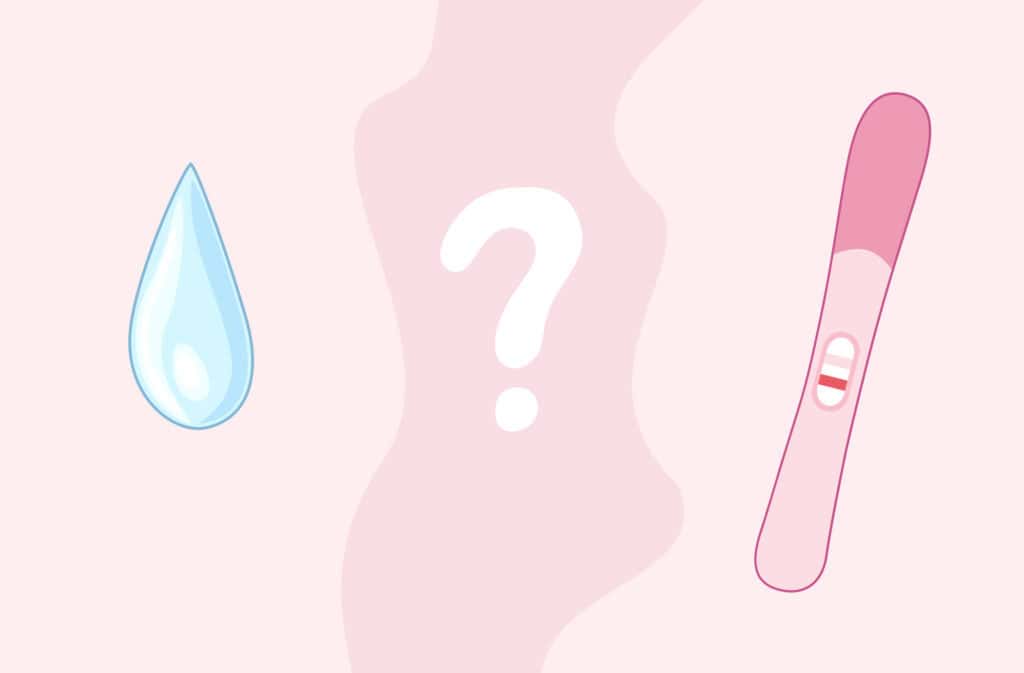Femia > Health Library > Your cycle > Health > Bloating during ovulation: Causes, symptoms, and how to relieve discomfort
Bloating during ovulation: Causes, symptoms, and how to relieve discomfort

- Updated Feb 11, 2025
- Published
CRAFTED BY HUMAN
Crafted by human At Femia, we provide accurate and up-to-date information at every stage of your journey, from trying to conceive, pregnancy and postnatal support. All content is created by a real person based on in-depth research and own professional experience. Femia ensures that you will receive expert advice, strict accuracy and a personalized approach from our authors/medical experts. Learn more about our editorial policy.
FACT CHECKED
Fact checked At Femia Health, we maintain the highest standards of editorial excellence in delivering content focused on helping you conceive, guiding you through pregnancy, and supporting you postpartum. Explore our content review principles to learn how we ensure the accuracy and quality of our health and lifestyle tips for every stage of your journey.
- Bloating during ovulation is a natural symptom that occurs due to hormonal changes in the body during this phase of the menstrual cycle.
- Bloating resolves on its own within 1–3 days. It can be reduced with certain lifestyle changes, like portion control, eating small meals and non-gassy foods, exercising, and massaging your abdomen with heating pads.
- Consult your doctor if bloating causes intense pain and lasts longer than a week.
Did you know that bloating during ovulation is a common symptom occurs due to hormonal changes in the body when an egg is released or about to be released from your ovary?
Ovulation bloating is harmless and resolves on its own within a few hours or days, but it’s often misunderstood. Understanding why bloating during ovulation happens—and when to be concerned—can help women manage it more effectively. Let’s delve deeper to find out.
Femia offers personalized insights on ovulation, hyperovulation,
and conception chances
Is bloating a sign of ovulation?
So, is bloating a sign of ovulation or a matter of concern? Yes, bloating can be a sign of ovulation, but it is not universally experienced by all women. It is usually not a cause for concern unless it is accompanied by severe pain or persists for a prolonged period. If bloating is intense or lasts too long, it’s important to consult with a healthcare provider.
Bloating during ovulation occurs as a result of hormonal changes in the body. The surge of LH levels just before ovulation and the increase in progesterone and estrogen levels after can cause changes in your digestive tract and water retention in the body, which may lead to bloating.
Bloating during ovulation may also appear with other symptoms because of hormonal fluctuations, like mood changes, breast tenderness, increased sex drive, minor pelvic pain, and changes in cervical mucus, like increased or egg white-like discharge.
Does ovulation cause bloating? Why it happens
Yes, ovulation causes bloating in some people, but its intensity and duration can vary from person to person. Generally, the bloating sensation disappears within a few days.
Ovulation bloating happens as a result of:
- Hormonal changes in the body that cause water retention and, to a lesser extent, increased gas. Water retention is one of the primary contributors to bloating during ovulation.
- The release of progesterone during ovulation, which slows down gastrointestinal motility.
- Mild, one-sided pain in the lower abdomen called Mittelschmerz occurs when an egg is released from your ovary. It usually lasts for a few hours, but it does not always come with bloating. Bloating and Mittelschmerz are separate occurrences that may happen together, but they are not directly related.
👉Find out more: Fertility hormones: Essential female reproductive hormones and how to balance them for conception
Is bloating during ovulation normal?
So, is bloating normal during ovulation? Yes, it’s completely normal. It can be a healthy symptom of a woman’s fertility, and it helps signal that your ovulation phase is approaching.
How long does ovulation bloating last?
Ovulation bloating typically lasts from a couple of hours to a few days. It typically resolves in one to three days, as your hormonal levels start to stabilize after the ovulation window ends.
In some people, the duration of ovulation bloating may exceed this range because of other factors, like stress, eating large, heavy meals, or gas.
Weight gain during ovulation
Weight gain during ovulation is a temporary symptom, just like bloating. It can occur due to water retention in the body because of hormonal changes.
The weight returns to normal as your hormones balance after ovulation within a couple of days, and it is not an actual fat gain. So, weight gain during ovulation is not a concerning symptom; it is a symptom of hormonal changes that resolves on its own. Eating a balanced diet during ovulation will help you normalize your weight faster.
How to relieve bloating during ovulation
You can reduce bloating during ovulation with the following cycle-syncing changes:
1. Eat smaller meals and non-gassy foods
Eating large meals or foods that tend to cause gas, especially at night, can exaggerate bloating during ovulation and lead to digestive issues. Avoid foods that you personally know cause bloating, such as beans, cabbage, and carbonated drinks. While vegetables, whole grains, and fruits are generally healthy for digestion, they may cause bloating for some individuals, so it’s important to listen to your body and avoid foods that trigger discomfort.
So, how to relieve gas during ovulation?
During ovulation, which is around 10–16 days before the start of your next menstrual period, try avoiding large meals and gassy foods.
Practice portion control, eat a balanced diet, and have smaller meals. Moreover, try having your dinner at least 3–4 hours before you go to bed, and eat something light, like leafy greens, brown rice, quinoa, or oatmeal.
2. Walk
The hormonal changes during ovulation can cause slow digestion, leading to bloating. Moderate exercise, like walking for 30–45 minutes, can help improve digestion and relieve bloating.
3. Massage your abdomen with a hot water bag or heating pad
Another way to reduce bloating is to massage your abdomen with a heating pad. It will relax your stomach muscles, release trapped gas, and relieve inflammation.
4. Stay hydrated
Ensuring sufficient water intake of up to 8–10 glasses per day during your ovulation can flush excess sodium and wastes from your body and prevent water retention, which can help relieve bloating.
5. Minimize stress
Stress also causes gastrointestinal disturbances, like cramping, bloating, ulcers, and diarrhea. Make sure to minimize stress during your ovulation days by engaging in relaxing activities, like meditation, yoga, exercise, and involving yourself in things you enjoy.
👉Find out more: How many eggs does a woman have? Understanding egg count and fertility by age
When to see a doctor about ovulation bloating

You should consult a doctor about ovulation bloating when:
- Bloating is severe and unbearable and lasts for more than a week.
- Bloating also occurs outside the ovulation window.
- You experience other noticeable symptoms with bloating, like weight gain, fatigue, depression, chronic pelvic pain, nausea, difficulty conceiving, excessive pain during periods, acne, or others.
It’s crucial to consult your healthcare provider if you experience severe bloating symptoms that last longer than a few days, as this could be a sign of other conditions, like PCOS, endometriosis, or gastrointestinal issues.
Femia offers personalized insights on ovulation, hyperovulation,
and conception chances
Questions from the Femia community
Does bloating during ovulation mean I’m fertile?
Bloating is a common symptom of ovulation, and ovulation is the most fertile period of a woman. However, it is not a definitive indicator of fertility or ovulation, as the occurrence of bloating can vary from person to person. It can also happen due to reasons besides ovulation, like gastrointestinal disturbances, stress, or others.
Can ovulation bloating feel like pregnancy bloating?
Yes, ovulation bloating can feel like pregnancy bloating, as they both occur because of hormonal changes in the body, but the two phases are unrelated. Bloating during pregnancy typically occurs with more noticeable and prolonged symptoms, like nausea and vomiting, breast tenderness, and food cravings.
Can ovulation bloating be mistaken for a health issue?
Yes, people who are unaware of ovulation bloating can mistake it as a health issue. Bloating that is severe, intense, and occurs for a prolonged period may indicate a health issue, like ovarian cysts or IBS (irritable bowel syndrome)—a condition that affects your stomach and intestine and causes bloating, stomach cramps, and diarrhea. So, if you experience intense and prolonged pain, it is essential to consult your healthcare provider for a personalized checkup and to rule out any other conditions.
Why do some women not experience bloating during ovulation?
Not every woman experiences ovulation bloating, as hormonal responses vary from person to person depending on their unique body physiology. So, it's normal for women not to experience bloating, and it doesn't indicate that ovulation did not occur or that the woman isn't fertile.
The bottom line
Bloating is a common ovulation symptom, and its occurrence and intensity can vary in each woman. Bloating typically resolves on its own within 1–3 days as hormonal levels stabilize.
Balancing your diet, eating light meals, maintaining hydration, and engaging in moderate exercise can help reduce bloating and discomfort during ovulation.
However, it is crucial to consult a healthcare provider if bloating persists for more than a week or the pain is intense and unbearable, as this can be a sign of other medical conditions, like ovarian cysts or endometriosis.
References
- “Ovulation.” Cleveland Clinic, 1 May 2024, my.clevelandclinic.org/health/articles/23439-ovulation.
- Coquoz, A., et al. “Impact of Progesterone on the Gastrointestinal Tract: A Comprehensive Literature Review.” Climacteric, vol. 25, no. 4, Mar. 2022, pp. 337–61. https://doi.org/10.1080/13697137.2022.2033203.
- “Mittelschmerz – Symptoms and Causes.” Mayo Clinic, www.mayoclinic.org/diseases-conditions/mittelschmerz/symptoms-causes/syc-20375122.
- Dehghan, Mahlagha, et al. “The Effect of Abdominal Massage on Gastrointestinal Functions: A Systematic Review.” Complementary Therapies in Medicine, vol. 54, Sept. 2020, p. 102553. https://doi.org/10.1016/j.ctim.2020.102553.
- “Stress and the Gut: Pathophysiology, Clinical Consequences, Diagnostic Approach and Treatment Options.” PubMed, 1 Dec. 2011, pubmed.ncbi.nlm.nih.gov/22314561.

Discover the symptoms, causes, treatment and misconceptions of low testosterone in women, including age-related testosterone levels and when to consult a doctor.

Discover what vabbing is and if this vagina perfume trend really works. Learn about vabbing benefits, safety at the gym, and the science behind this viral practice. Expert insights from Femia.

What is precum? Find out everything you need to know about pre-ejaculatory fluid: when does precum occur and what is the chance of getting pregnant from precum?

